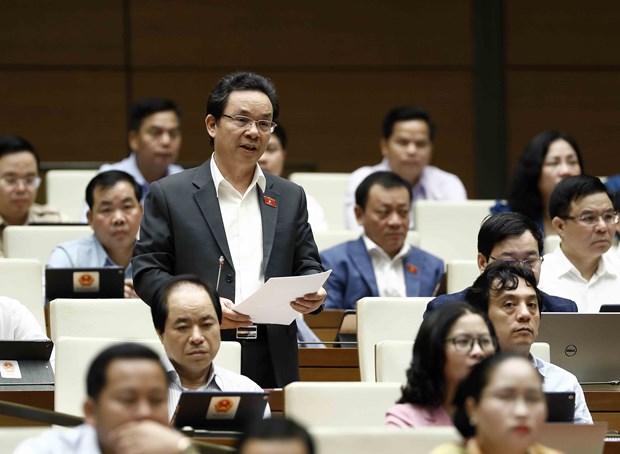 Society
Society


|
| Deputy Nguyễn Văn Cường from the Hà Nội delegation gives his thoughts on the draft amended law on Medical Examination and Treatment on Monday morning. — VNA/VNS Photo |
HÀ NỘI — National Assembly (NA) deputies on Monday called for autonomy mechanisms for public healthcare facilities, especially the right for self-determination in their medical examination and treatment activities, organisation, human resources and finance.
On Monday morning, the 15th NA discussed a draft amendment Law on Medical Examination and Treatment. The draft has 12 chapters with 121 articles, 15 more than its previous edition. The NA Standing Committee collected opinions and would improve the draft further so that it would hopefully be submitted and approved on November 14, one day before the wrap-up of this fourth session.
Deputy Hoàng Văn Cường from Hà Nội said that it was a great concern to see thousands of medical workers quit jobs at public hospitals in the past time. Meanwhile, big public hospitals asked to stop autonomy as they previously wanted to receive funding from the State budget.
Most doctors and nurses want their hospital to be fully equipped with modern medical equipment, drugs and supplies so that doctors can choose to implement the most effective treatment regimens instead of facing limitations by restrictive constraints on costs, categories of drugs, and devices.
Many Vietnamese patients went abroad for medical treatment or preferred using services at private/international hospitals because of their more modern equipment, Cường said.
"All of the above issues have the same basic cause relating to management mechanism that has not allowed public hospitals to exploit its functions and advantages fully," Cường said, adding that Việt Nam still did not have sufficient regulations on mechanisms for hospitals to promote their expertise, skills, reputation.
Giving autonomy to non-business State units, particularly public hospitals, is an inevitable trend, Cường said, emphasising that the draft of the amended medical examination and treatment needs to include regulations on the issue.
Hospitals given autonomy must be able to decide on their prices for medical services based on economic and technical norms established and publicised by the unit so that hospital workers can participate in supervision," said Cường.
"It is necessary to define a financial management mechanism for autonomy so that hospitals can decide on their use of revenue, the level of salary payment, or how much they spend on investment, procurement, investment and development funds or support funds for poor patients," he said.
Deputy Trần Khánh Thu from Thái Bình Province said that public health facilities now were facing difficulties in implementing autonomy. Still, the draft of the amended law did not have provisions for it.
Regulations on financial autonomy for public health units should be added to the draft. It was necessary to determine the degree of autonomy, classification principles, and criteria for autonomy for public healthcare units.
Socialisation
Chairman of the National Assembly's Committee on Social Affairs Nguyễn Thúy Anh said that the draft law has articles on costs of medical examination and treatment prices and financial sources for medical examination and treatment and socialisation.
At least eight other laws now regulate finance in medical examination and treatment, she said, adding that some problems in the financial mechanism for medical examination and treatment were proposed to be amended in the Law on Bidding, Law on Prices and some other specialised laws.
"There is no distinction between public and private healthcare in the regulations. However, in each law, if it is related to the characteristics of private medical examination and treatment establishments, there are specific applicable regulations," she said.
The NA Standing Committee's socialisation and investment in healthcare were quite diversified and subjected to many laws. However, in the updated draft, NA Standing Committee agreed to clarify forms of socialisation, and the investment under the form of public-private partnership was appliable only in establishing medical examination and treatment units and infrastructure development, Thúy Anh said.
Regarding public-private cooperation, Deputy Nguyễn Lân Hiếu from Bình Định Province said that the forms of lending, leasing, buying with deferred payment, sponsorship in association with foreign organisations were updated in the draft.
However, more regulations on non-profit partnerships were also needed. Accordingly, investors would spend money to build healthcare infrastructure while public facilities would use the profits to continue reinvesting for humanitarian activities.
Also, at the NA agenda, deputies called on more specific incentives and allowances for medical workers to be added in the draft to better reflect Party and State's policies. VNS




